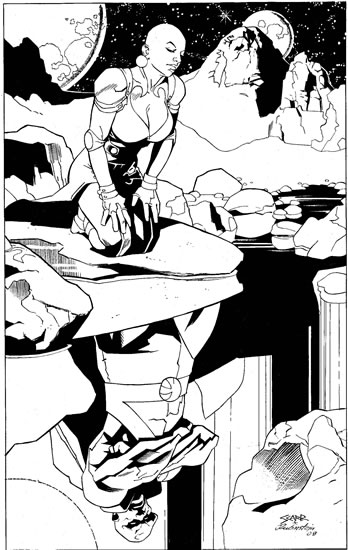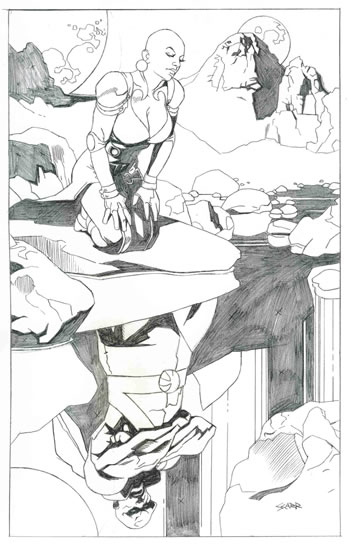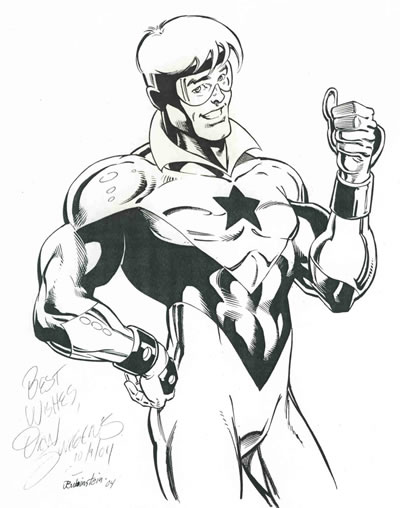It takes two, baby
One of the factors that makes comic book art unique among the traditional graphic arts is its collaborative nature.

When you view a painting, you are in most cases seeing the artistic vision and technical skills of a single creator. (That is, unless you're looking at a Thomas Kinkade, in which case you're probably seeing the uncredited work of some anonymous schlub toiling away for a pittance in some Third World backwater while the talentless hack who signed his name to the piece makes serious bank off the poor sucker's labor. But I digress.)
When you open a comic book, however — especially any comic book published by either of the two giants in the field, Marvel or DC — you're rarely viewing the work of a single artist. In most instances, there are four artists involved:
Which is all the more reason to marvel (no pun intended) at the beauty and power of the art combining the efforts of these disparate creators.
In commissioned comic art, the process is much the same. Frequently, I will commission a pencil drawing from one artist, and later hire another artist to ink the piece. (I've yet to commission either color work or lettering, but many collectors do.) Often, there's no connection between the penciler and the inker. In fact, the penciler may never see how his or her original art was finished, unless he or she stumbles upon it here, or in my online gallery at Comic Art Fans.

Here's an instance, however, in which the penciler, although working independently of the inker who would finish the art, created the original with the talents of a specific inker in mind. The pencil drawing seen above emerged from the imagination of artist Steve Carr. At the time that I commissioned this piece, Steve knew that I intended to commission comics veteran Joe Rubinstein to ink over his pencils. The completed artwork at the beginning of this post shows a remarkable synergy between these two masterful talents.
As SSTOL regulars can attest, the redoubtable Mr. Rubinstein has inked quite a number of pieces for me over the past several years. Joe, in fact, did the very first inking job I ever commissioned — this sketch of DC's roguish hero from the 25th century, Booster Gold, drawn for me by Booster's creator, Dan Jurgens.

When I commissioned this drawing from Dan Jurgens, he had no idea that Joe would ink it. And yet, the attributes of the two artists meld together seamlessly, as if the entire piece had leapt from the same deft hand.
Pretty nifty, I'd say.
And that's your Comic Art Friday.

When you view a painting, you are in most cases seeing the artistic vision and technical skills of a single creator. (That is, unless you're looking at a Thomas Kinkade, in which case you're probably seeing the uncredited work of some anonymous schlub toiling away for a pittance in some Third World backwater while the talentless hack who signed his name to the piece makes serious bank off the poor sucker's labor. But I digress.)
When you open a comic book, however — especially any comic book published by either of the two giants in the field, Marvel or DC — you're rarely viewing the work of a single artist. In most instances, there are four artists involved:
- The penciler (sometimes spelled penciller by the illiterates in the production department), who draws the basic designs for each page in (you're way ahead of me) pencil.
- The inker, who embellishes the pencil drawings in India ink — often adding detail and clarity not present in the penciler's original work.
- The colorist, who adds all of the color (and, increasingly these days, computer-generated effects). This used to be done on paper with colored dyes; today, it's done almost exclusively in a virtual environment, using Photoshop or some similar program. In either case, the coloring is never done on the actual inked art. In the days when coloring was accomplished by hand with dyes, the work was done on photocopies called color guides.
- The letterer, who inserts all of the dialogue and caption text, as well as the "visual sound effects." This, too, is now done mostly on computer, with specially created fonts.
Which is all the more reason to marvel (no pun intended) at the beauty and power of the art combining the efforts of these disparate creators.
In commissioned comic art, the process is much the same. Frequently, I will commission a pencil drawing from one artist, and later hire another artist to ink the piece. (I've yet to commission either color work or lettering, but many collectors do.) Often, there's no connection between the penciler and the inker. In fact, the penciler may never see how his or her original art was finished, unless he or she stumbles upon it here, or in my online gallery at Comic Art Fans.

Here's an instance, however, in which the penciler, although working independently of the inker who would finish the art, created the original with the talents of a specific inker in mind. The pencil drawing seen above emerged from the imagination of artist Steve Carr. At the time that I commissioned this piece, Steve knew that I intended to commission comics veteran Joe Rubinstein to ink over his pencils. The completed artwork at the beginning of this post shows a remarkable synergy between these two masterful talents.
As SSTOL regulars can attest, the redoubtable Mr. Rubinstein has inked quite a number of pieces for me over the past several years. Joe, in fact, did the very first inking job I ever commissioned — this sketch of DC's roguish hero from the 25th century, Booster Gold, drawn for me by Booster's creator, Dan Jurgens.

When I commissioned this drawing from Dan Jurgens, he had no idea that Joe would ink it. And yet, the attributes of the two artists meld together seamlessly, as if the entire piece had leapt from the same deft hand.
Pretty nifty, I'd say.
And that's your Comic Art Friday.
Labels: Comic Art Friday









1 insisted on sticking two cents in:
That Carr/Rubenstein piece is so gorgeous, its almost surreal. One of the crown jewels of your collection.
Post a Comment
<< Home